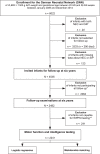Surgical necrotizing enterocolitis but not spontaneous intestinal perforation is associated with adverse neurological outcome at school age
- PMID: 32047169
- PMCID: PMC7012917
- DOI: 10.1038/s41598-020-58761-6
Surgical necrotizing enterocolitis but not spontaneous intestinal perforation is associated with adverse neurological outcome at school age
Abstract
Gastrointestinal complications during the neonatal period, i.e. necrotizing enterocolitis (NEC) and spontaneous intestinal perforation (SIP), are associated with adverse short-term outcome in very-low-birthweight infants (VLBWI, <1500 g birth weight). However, little is known about the neurological outcome of survivors at school age. We analysed data of 2241 infants followed-up at the age of 6 years. To determine the effect of NEC and SIP on cognitive outcome in consideration of other important confounding factors, we used multivariable logistic regression models. In addition, infants with surgical diagnosis of NEC (n = 43) or SIP (n = 41) were compared to NEC (n = 43) or SIP (n = 41) negative controls using Mahalanobis distance matching. Infants with a history for NEC had a three times increased risk (RR 3.0 [1.8-4.2], p < 0.001) to develop IQ scores <85 while history of surgical SIP did not increase the relative risk for lower IQs at school age (RR 1.0 [0.4-2.1], p = 1.000). In a matched-cohort analysis, we confirmed that infants with surgical NEC had lower mean IQ results than unaffected controls (±SD) (85±17 vs. 94±14, p = 0.023) while no differences were found for history of SIP. Our results reflect that the different aetiology and inflammatory extent of NEC and SIP may lead to disparate neurodevelopment trajectories. Hence, our data suggest a potential role of early gut-brain axis distortion in infants with NEC which needs to be further explored.
Conflict of interest statement
The authors declare no competing interests.
Figures


References
Publication types
MeSH terms
LinkOut - more resources
Full Text Sources
Medical
Miscellaneous

